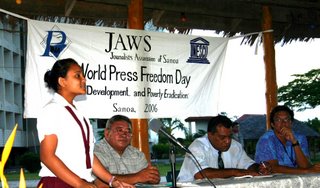
Sulesa Simanu
Maluafo College
Media, Development and Poverty Eradication in Samoa.
Today, I would like to thank God, it is indeed a joyous day, a day where the freedom of the press is celebrated around the world. Today, we celebrate our freedom, my freedom and our freedom and God given right of expression through the media.
Today is an important day for democracy in the world. It is of course of utmost value to Journalists who suppressed, who cannot express themselves freely and especially those under Governments who do not allow them to do so.
In some countries Journalists have been imprisoned, killed and publicly shunned. But let me ask a question: What is the true meaning of Media, Development and Poverty Eradication?
Or should I say, "How can the media assist in the development of a country and therefore take away poverty?
The different forms of media are really important to the development of any country. The media delivers written information and publicises methods, skills and other useful details about successful means of livelihoods. As we all know this is the journey to development and this of course means a healthy economy. Our people will live well, happy and healthy and poverty will be eradicated.
If the press or the media is free, informative and fair, Samoans will know how to plant fruits and vegetables, they will know who to plant the nonu and market it overseas, Samoans will know how to take care of cows and sheep. Samoans will also know how to nurture and harvest useful sea creatures such as clams and market it overseas. They will also be aware and knowledgeable in the establishment of small businesses.
And if Samoa is aware of all these things and reap from the knowledge of these livelihoods and development;
- We will have plenty of food
- Every child will have a good education
- We will all live in good houses
- Health will improve and that means our people will live happy and healthy
Events are occurring around the world and in our country. They say there is no freedom of the press and journalists are being taken to court and suppressed. But be reminded that Samoa is a free and democratic nation. We are founded on God through Christianity. We are unique and differ greatly from other countries in the word, with our culture, the FaaSamoa and respect, the faaaloalo.
If someone should exercise their freedom of expression and discuss sex through the media I feel there are respectful ways to express these issues. We have to take into consideration that Head of State is listening, reading and watching, that our mothers and fathers, that servants of God and that the whole country are listening, reading and watching the media. We are culture with values, we have the sacred relationship between man and woman and this is exactly why we are unique.
We are a Christian country with a culture of respect and some might say, " Samoa is the Israel of the Pacific." There is an article in the Constitution, which addresses defamation supported by facts and lawful evidence.Today I feel we should thank God. Freedom of the Press is our freedom. The Media assists in the development of our livelihoods, which leads to the eradication of poverty. However this Freedom should be observed with caution, attack the issue but mind the manner in which you do it. Please do not let your freedom as a Journalist take away your values as a Samoan, let there be a fine line between freedom of the press and respect for others, because after all, we are a respectful nation.
 JAWS would like to say talofa to the Journalists of the beautiful Cook Islands and the soon to be reformed Cook Islands Journalists Association (CIJA). Please find below the first entry on their new weblog, started by Jason Brown.
JAWS would like to say talofa to the Journalists of the beautiful Cook Islands and the soon to be reformed Cook Islands Journalists Association (CIJA). Please find below the first entry on their new weblog, started by Jason Brown.



